uslistings.org
Utilising human-review and AI to become the most thorough website review service for US businesses
★ Get your own unique FAQ + Selling Points on your profile page
★ be seen by 1000s of daily visitors and win new business
uslistings.org Ephemeral Miniblog
The Quiet Drama of Bodie
 You’ll find it tucked behind a diner called Patty’s Pancakes and a car wash that’s seen more rust than rain—Bodie, California: a ghost town with more character than my Aunt Jean’s birthday karaoke. Established during the Gold Rush, Bodie once bustled with miners, mayhem, and more saloons than sense. Today, it’s an open-air museum, preserved in a state of arrested decay—like your uncle’s perm from 1978.
You’ll find it tucked behind a diner called Patty’s Pancakes and a car wash that’s seen more rust than rain—Bodie, California: a ghost town with more character than my Aunt Jean’s birthday karaoke. Established during the Gold Rush, Bodie once bustled with miners, mayhem, and more saloons than sense. Today, it’s an open-air museum, preserved in a state of arrested decay—like your uncle’s perm from 1978.You can peer into schoolhouses with chalk still on the board and homes where the dishes are still by the sink—because apparently even ghosts leave the washing up. There’s no cell reception, which is liberating or harrowing depending on your relationship with Instagram.
It’s the silences that impress—the wind muttering through dry eaves, doors creaking like they’ve got complaints. Bodie doesn’t shout for attention. It just quietly gets on with being haunting and glorious. If you want neon lights and avocado toast, stay in Vegas. If you want history with dust on it, Bodie’s your place.
Loading...
Fire, Flight, and Geographic Feels: January 27th in America
 On this day (January 27), history said, “We’re doing everything at once.” First, in 1967, NASA’s Apollo 1 mission ended in tragedy when a cabin fire during a launch rehearsal took the lives of three astronauts. It was a gut punch in the space race, forcing America to come face-to-face with the immense risks of exploring the unknown. But here's the thing—out of that devastation came sweeping changes to safety protocols. That moment wasn't just a loss; it was a reset.
On this day (January 27), history said, “We’re doing everything at once.” First, in 1967, NASA’s Apollo 1 mission ended in tragedy when a cabin fire during a launch rehearsal took the lives of three astronauts. It was a gut punch in the space race, forcing America to come face-to-face with the immense risks of exploring the unknown. But here's the thing—out of that devastation came sweeping changes to safety protocols. That moment wasn't just a loss; it was a reset.Fast forward to 1984, and Michael Jackson set his hair—and arguably Pepsi’s reputation—on fire during a commercial shoot. But instead of retreating, he turned it into a comeback story, walking out of the hospital and moonwalking into history.
And in a different kind of discovery, 1888 saw the founding of the National Geographic Society—a group of scientists, adventurers, and probably a few guys who just really liked maps. They didn’t just publish magazines, they gave curious minds a passport to the planet.
January 27 reminds us: whether it’s tragedy, talent, or tenacity—what we do with a moment defines us.
Loading...
The Cold War Catacomb You’ve Never Heard Of
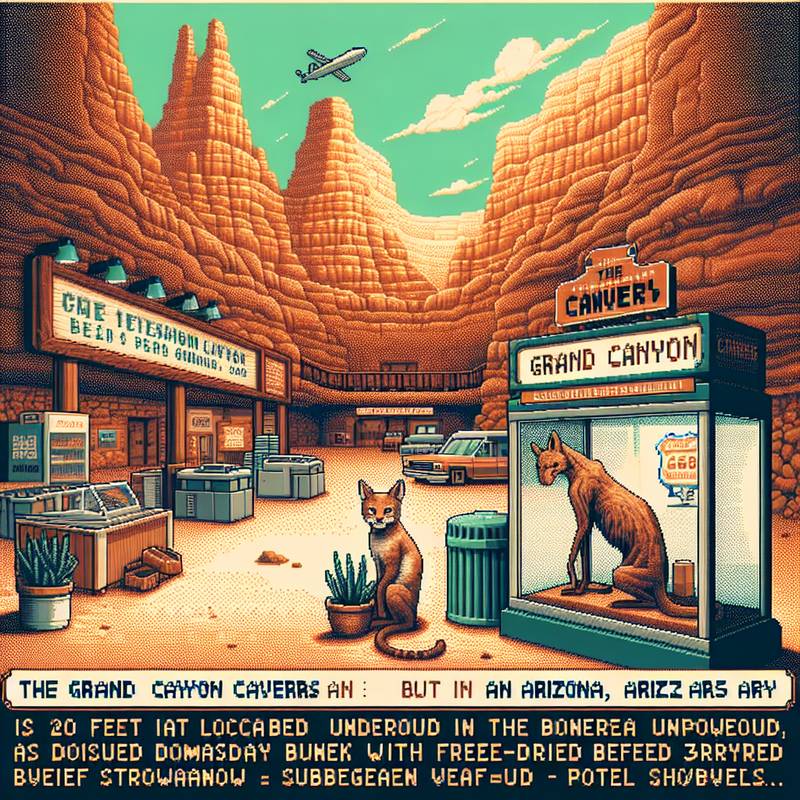 There’s a cavern in Arizona called the Grand Canyon Caverns, and no, it’s not inside the Grand Canyon—it’s 40 miles away like a sulky sibling sitting in the corner at a family reunion. This place is 200 feet underground, bone-dry, and contains the most American thing imaginable: a fully stocked doomsday bunker complete with freeze-dried beef stroganoff and, presumably, regret. Formed 65 million years ago by a river that changed its mind and left, the caverns now host tours and even a subterranean hotel room, perfect for people whose idea of luxury involves echoing silence and the distant whirr of air filtration.
There’s a cavern in Arizona called the Grand Canyon Caverns, and no, it’s not inside the Grand Canyon—it’s 40 miles away like a sulky sibling sitting in the corner at a family reunion. This place is 200 feet underground, bone-dry, and contains the most American thing imaginable: a fully stocked doomsday bunker complete with freeze-dried beef stroganoff and, presumably, regret. Formed 65 million years ago by a river that changed its mind and left, the caverns now host tours and even a subterranean hotel room, perfect for people whose idea of luxury involves echoing silence and the distant whirr of air filtration.The oddest delight? The mummified bobcat, dead for decades, preserved by the sheer apathy of humidity. It’s less 'exhibit' and more 'involuntary mummy,' a sort of feline Pompeii.
So, for those fed up with sunshine and real-time communication, and who’ve ever wondered what concrete Cold War optimism smells like beneath a Route 66 souvenir shop—descend. It’s bizarre, brilliant, and deeply unbothered by the passage of time.
Loading...
American Escalation: A Brief History of Boldness
 It began with a tea party, as all civilized tantrums do. A few offended sensibilities tossed crates of Earl Grey into the harbor, and before anyone could dry their stockings, thirteen colonies decided they’d quite like to be thirteen countries, thank you. Independence was declared with quills and powdered wigs, and after a few musket volleys and some help from the French—who were always delighted to meddle—they got their wish.
It began with a tea party, as all civilized tantrums do. A few offended sensibilities tossed crates of Earl Grey into the harbor, and before anyone could dry their stockings, thirteen colonies decided they’d quite like to be thirteen countries, thank you. Independence was declared with quills and powdered wigs, and after a few musket volleys and some help from the French—who were always delighted to meddle—they got their wish.Then came expansion, the sort of growth that would make a waistline wince. The frontier rolled westward, devouring land and logic alike. Gold was found, trains were laid like corset stays across the continent, and cities sprouted with the tenacity of dandelions.
Industries rose like gothic cathedrals, smoke crowned them prophets of progress. Immigrants poured in, dreaming in twelve-hour shifts. Wars came, as wars always do, and left their ash upon everything. A Depression taught thrift; rockets taught ambition. The story of America is a series of audacious steps, often sideways, sometimes backward, rarely quiet.
All of it because someone couldn’t bear the price of tea.
Loading...
Peaks, Gas Stations, and the Lobster Roll They Won’t Tell You About
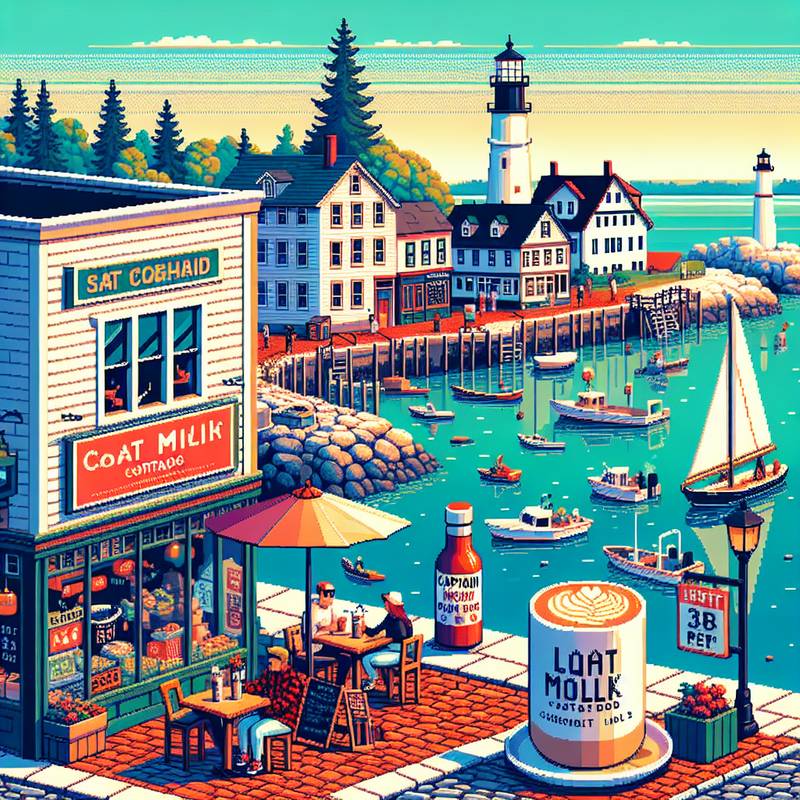 The first thing you notice about Portland, Maine, is that everyone’s calmly smug about living there. They're sipping oatmilk cortados on cobblestone streets like they're in a Wes Anderson movie with way more flannel. But what they don’t put on the postcards is that the real best lobster roll isn’t on the waterfront—it’s tucked behind a gas station on Forest Avenue, where the locals go when they don’t feel like elbowing through tourists wearing “MAINE: THE WAY LIFE SHOULD BE” hoodies they bought ironically. Captain Mowatt’s hot sauces are the unspoken truth: everyone has at least three in their pantry, none of which are labeled 'mild. Also: those lighthouses? Gorgeous. But the real views are from the back of Peaks Island’s golf cart rental loop, where you’ll get salt-air, sea glass, and the kind of silence that makes you reevaluate whether you even liked the city you came from. Just don’t Instagram it—then everyone will know.
The first thing you notice about Portland, Maine, is that everyone’s calmly smug about living there. They're sipping oatmilk cortados on cobblestone streets like they're in a Wes Anderson movie with way more flannel. But what they don’t put on the postcards is that the real best lobster roll isn’t on the waterfront—it’s tucked behind a gas station on Forest Avenue, where the locals go when they don’t feel like elbowing through tourists wearing “MAINE: THE WAY LIFE SHOULD BE” hoodies they bought ironically. Captain Mowatt’s hot sauces are the unspoken truth: everyone has at least three in their pantry, none of which are labeled 'mild. Also: those lighthouses? Gorgeous. But the real views are from the back of Peaks Island’s golf cart rental loop, where you’ll get salt-air, sea glass, and the kind of silence that makes you reevaluate whether you even liked the city you came from. Just don’t Instagram it—then everyone will know.Loading...
Rust and Rhythm: Chicago vs. New Orleans
 Chicago broods, all elbowed angles and rusted bones, the wind sharpening its teeth on Lake Michigan. It’s a city that’s taken punches and spits back blood with jazz in its throat. Blues spill from cracked doorways, and the ghosts of stockyard sweat still cling to the South Side air. The grid's brutal but honest—streets that don’t lie, just carve.
Chicago broods, all elbowed angles and rusted bones, the wind sharpening its teeth on Lake Michigan. It’s a city that’s taken punches and spits back blood with jazz in its throat. Blues spill from cracked doorways, and the ghosts of stockyard sweat still cling to the South Side air. The grid's brutal but honest—streets that don’t lie, just carve.Then there’s New Orleans, drunk on its own myth, creole rhythms swaying through the heat-heavy haze. Streets curl like smoke and history dances barefoot with the dead. It’s indulgence masquerading as tradition, where celebration’s stitched into mourning and even the ruins samba.
Chicago builds with fists; New Orleans whispers in tongues. One’s the grind, the other the sway. Both heroes of their own folklore—Chicago’s shaped by steel and union roar, New Orleans by brass and bourbon-slurred saints. Each city a memory that refuses to fade—one burned in iron, the other steeped in spirit.
Time bruises them differently, but doesn’t forget either.
Loading...
Potluck: The Delicious American Social Test
 Some Americans say “bring a dish” like it’s a friendly invite—but what they mean is, “Feed yourself AND us, too!” That’s called a potluck. Potluck! Sounds like a culinary gamble. You show up, hoping someone brought mac and cheese, and not that one aunt’s cold raisins-in-mayo salad.
Some Americans say “bring a dish” like it’s a friendly invite—but what they mean is, “Feed yourself AND us, too!” That’s called a potluck. Potluck! Sounds like a culinary gamble. You show up, hoping someone brought mac and cheese, and not that one aunt’s cold raisins-in-mayo salad.See, in most countries, if someone invites you over, they cook for you. In the US, you better show up with a Tupperware full of ambition. And if you don’t? Folks will smile, but they’ll remember. “Oh, that’s the guy who came empty-handed and left with dessert.”
Americans love sharing, but they also love fairness. You can’t just eat three plates and contribute napkins! You gotta bring something worthy. And don’t try sneaky stuff like showing up with grocery store cookies, still in the plastic—the Aunties see everything.
Potluck isn’t just about food—it’s about your place in the community. Bring good food, and you’re family. Show up with ice... and you’re just a plus one.
Loading...
Elephant Rocks Behind the Zoo
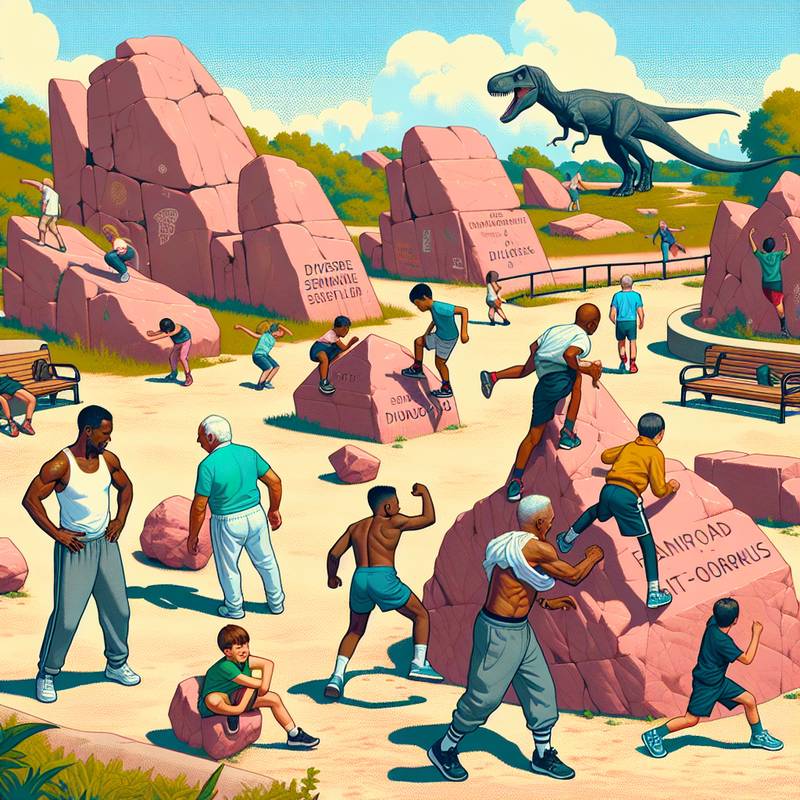 Every October in St. Louis, when summer forgets to leave, locals know to walk past the zoo’s north entrance—not for the animals, but for the elephant rocks. Not the state park, but the quiet outcrop hidden behind the Emerson Dinoroarus exhibit, where pink granite boulders warm in the sun and kids climb like they're invincible. It's not a sanctioned path. No signs. Just word-of-mouth and muscle memory passed down like family recipes. In a city wrapped in fragmentary borders—cultural, municipal, imagined—this is one of those in-between places. It belongs to everyone and no one.
Every October in St. Louis, when summer forgets to leave, locals know to walk past the zoo’s north entrance—not for the animals, but for the elephant rocks. Not the state park, but the quiet outcrop hidden behind the Emerson Dinoroarus exhibit, where pink granite boulders warm in the sun and kids climb like they're invincible. It's not a sanctioned path. No signs. Just word-of-mouth and muscle memory passed down like family recipes. In a city wrapped in fragmentary borders—cultural, municipal, imagined—this is one of those in-between places. It belongs to everyone and no one. Early mornings, older men stretch there, serious in sweatpants, the kind who grew up believing in discipline because their world required it. Teenagers carve initials into stone like permanence could be earned. The rocks don’t care. They outlast us all. And those in the know—those who return year after year—understand this hidden corner isn’t about escape. It’s about return. It's about claiming space in a city that doesn't always give it freely.
Loading...
An Inaugural Inventory of Curious Contradictions
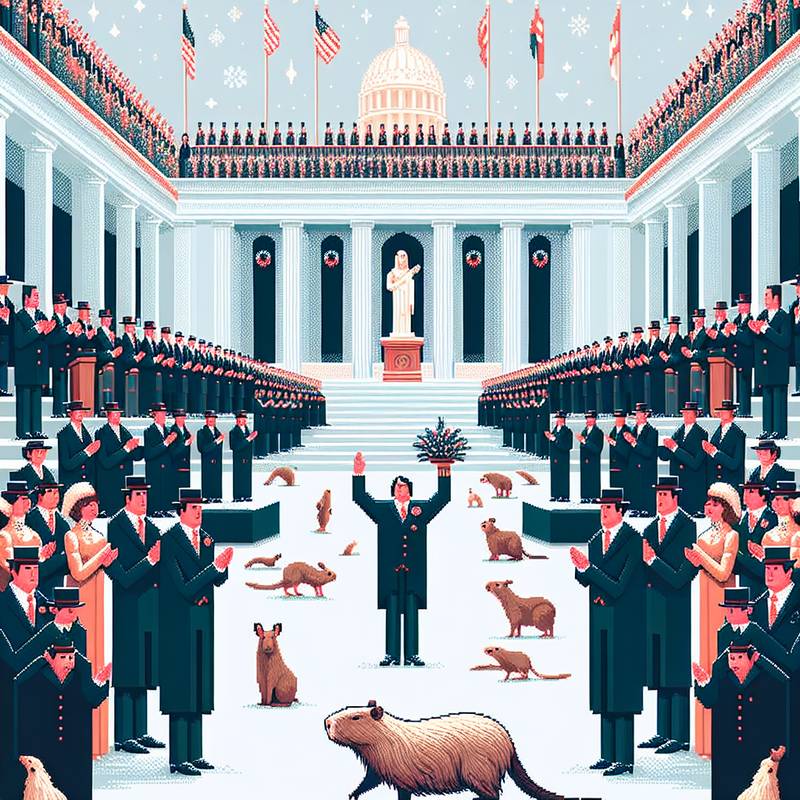 On this day (20 January), the American calendar reveals itself as a curious ledger of both noble ceremonies and oddities unfit for rational digestion. It was on this day in 1981 that a man known merely as an actor raised his hand and became a nation's figurehead—thus proving, once more, that the theatre and leadership are oft-separated by no more than a curtain.
On this day (20 January), the American calendar reveals itself as a curious ledger of both noble ceremonies and oddities unfit for rational digestion. It was on this day in 1981 that a man known merely as an actor raised his hand and became a nation's figurehead—thus proving, once more, that the theatre and leadership are oft-separated by no more than a curtain.Yet, more peculiar still, on this very date in 2009, a presidential oath was so entangled in legalese that it required a second utterance, as if the Constitution itself had hiccupped. Consider then the year 1969, wherein a man took the solemn pledge amidst the snow and spoke of the silent majesty of peace—shortly before the clamor of war resumed its discordant hymn.
And while the nation watched from screens and snowy streets, the animals at the National Zoo, uninvited, carried on without pomp—except for a capybara who reportedly turned its back to the festivities.
No other nation observes solemnity with such theatrical spectacle.
Loading...
The Paradox of Benjamin Franklin
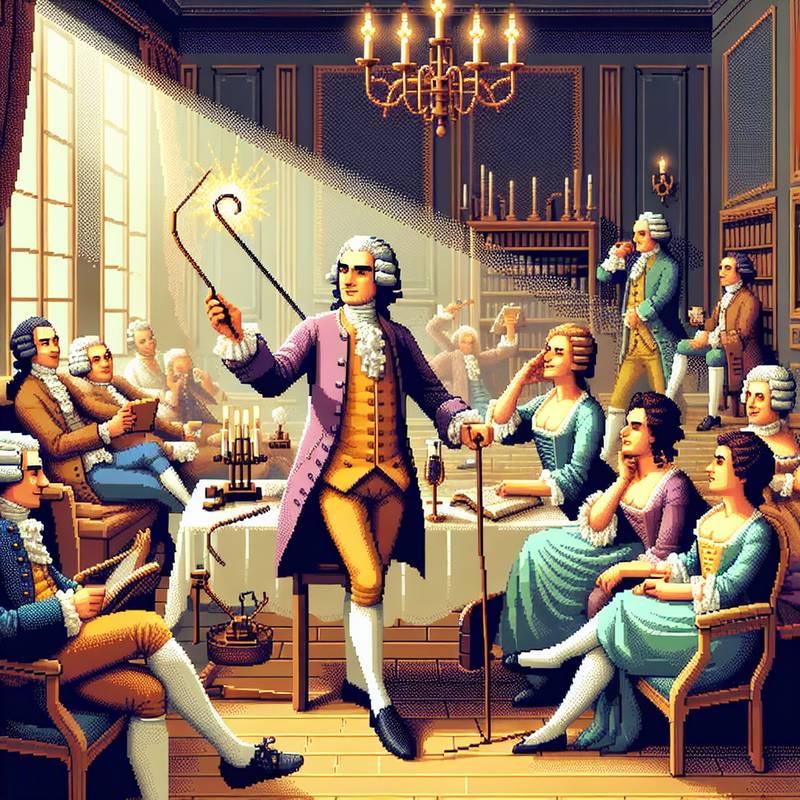 Beneath the powdered wigs of Washington’s early salons, few wore the mantle of contradiction more exquisitely than Benjamin Franklin. If you only know one thing about Franklin, know this: he was the only Founding Father who could charm European royalty and simultaneously invent the lightning rod while wearing spectacles he designed himself.
Beneath the powdered wigs of Washington’s early salons, few wore the mantle of contradiction more exquisitely than Benjamin Franklin. If you only know one thing about Franklin, know this: he was the only Founding Father who could charm European royalty and simultaneously invent the lightning rod while wearing spectacles he designed himself.He was America’s first self-made man and its first self-made myth. A printer by trade, he stitched together Poor Richard’s Almanack with snippets of wit sharp enough to make even the moonlight flinch. Yet behind his public thrift and virtue lay a man who danced in Paris, relished flirtation, and sipped the Enlightenment like fine claret.
Franklin’s genius wasn’t in discovering electricity, but in discovering the American mind—fickle, proud, endlessly curious, and deeply contradictory. He distilled ambition into aphorism and made moral rigor seem almost fashionable. If Jefferson penned liberty, Franklin persuaded it to pour the wine.
To understand Franklin is not to resolve him, but to relish the paradox. He was the candle and the mirror, burning and reflecting, always.
Loading...
Flaming Meat and Freedom
Every Fourth of July, Americans gather around fire hazards and flammable meats to celebrate their independence... by blowing stuff up and eating hot dogs they've chemically altered beyond recognition. Nothing says 'freedom' like watching your uncle ignite a small war in the driveway while wearing an apron that reads “Grill Sergeant.”And have you ever noticed how people salute the Founding Fathers by bingeing on soda the size of a toddler and shoving fireworks into watermelons? It’s a sacred ritual of explosive patriotism and arterial distress.
This is the country where citizens spend the day praising liberty while waiting in lines at Costco to stock up on burgers, beer, and buns from a plant that probably hasn't seen a grain of wheat in 10 years.
Some cultures chant. Some dance. Americans? They barbecue, drink overly sugared drinks, and blow up the sky. It’s like a birthday party for a country—and the candles are M-80s.
Just don’t ask too many questions. You'll ruin the magic... and maybe lose your eyebrows.
Loading...
Popeye, Beetles and Tectonic Plates
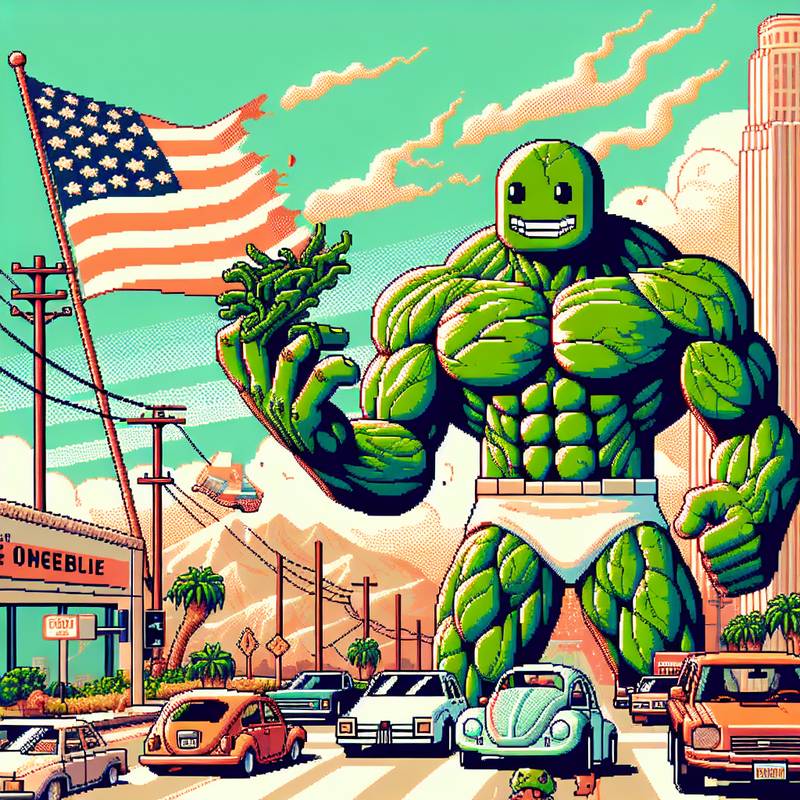 On this day (January 17), the United States managed to provide another eclectic mix of history, as if the country spins a giant wheel each morning to decide what sort of madness it will unleash.
On this day (January 17), the United States managed to provide another eclectic mix of history, as if the country spins a giant wheel each morning to decide what sort of madness it will unleash.In 1929, Popeye the Sailor made his comic strip debut. That’s right, a one-eyed spinach addict with forearms like overstuffed sausages became a national hero. People thought he was a great role model—presumably because his only known diet was tinned vegetables and he punched everything.
Then in 1949, the first ever Volkswagen Beetle arrived in the US. Americans took one look at it and thought, 'Yes, what this country really needs is a car that looks like a smug tortoise.” And now they're a cultural icon. We don’t even blink when someone's driving what appears to be a small, rounded shoebox.
And of course, in 1994, Los Angeles experienced a major earthquake. California's version of hitting the snooze button—just shake the entire city and see who gets up.
All in all, 17 January: slightly bizarre, mildly impressive, and entirely American.
Loading...
The Shape of Industry, the Taste of Ashes
 In the beginning, there was a spark—the industrial revolution humming to life beneath soot-darkened skies. Factories bloomed like iron flowers, and cities grew up toward the clouds. People reassembled themselves: hands that once tilled fields now turned dials and pressed levers, the rhythm of rural life replaced by the whistle and clatter of machines.
In the beginning, there was a spark—the industrial revolution humming to life beneath soot-darkened skies. Factories bloomed like iron flowers, and cities grew up toward the clouds. People reassembled themselves: hands that once tilled fields now turned dials and pressed levers, the rhythm of rural life replaced by the whistle and clatter of machines.Then came the Roaring Twenties, an era that danced too close to the flames. It was a time of jazz, silver flasks, and cities trembling with promise. But what rises too fast must fall. The Great Depression followed, silent and gray, folding dreams like paper houses in the rain. It was a hunger not just of stomach, but of spirit.
And so came the war, the blood, the raw forging of a modern world in fire and steel. What's left afterward—suburbia, the moon, a web of glass and electric light—grew from the bones of all that came before.
History isn’t a line. It’s a spiral staircase, and each step echoes, whether you climb or descend.
Loading...
Molasses, Geese, and the Improbability Engine
 On this day (15 January), the United States experienced a series of events so varied they could only have been the result of a cosmic bet between two bored superintelligent beings armed with a time machine and an inexplicable fondness for bureaucracy.
On this day (15 January), the United States experienced a series of events so varied they could only have been the result of a cosmic bet between two bored superintelligent beings armed with a time machine and an inexplicable fondness for bureaucracy.In 1919, Boston was engulfed by a Great Molasses Flood—an event that proved once and for all that physics, like cats, does not care what humans expect of it. A storage tank burst, releasing a sticky tsunami through the streets at an estimated 35 mph. Eyewitnesses claimed they could smell sugar for decades, though it’s possible some just stopped washing their socks.
On a less syrupy note, in 2009, US Airways Flight 1549 landed gracefully in the Hudson River after a dramatic encounter with a flock of geese. Most aircraft, when faced with bird-based adversity, tend to plummet with all the aerodynamic subtlety of an anvil in a lift. This one glided to safety, with the calm dignity of a swan who’s read all the manuals.
Clearly, 15 January has a fondness for the improbable.
Loading...
Lantern Words of the Hollow
 In the forgotten hollows of the Appalachian hills, there lingers a word as dusky and rooted as the red clay: “flummoxed.” Long before it was a curiosity to the cosmopolitan ear, it was muttered by front porch storytellers and mountain folk when faced with bewilderment too tangled for plainer speech. To be flummoxed is not only to be confused—it is to be turned around so wholly by circumstance that one's thoughts stumble and fall like leaves in a windstorm.
In the forgotten hollows of the Appalachian hills, there lingers a word as dusky and rooted as the red clay: “flummoxed.” Long before it was a curiosity to the cosmopolitan ear, it was muttered by front porch storytellers and mountain folk when faced with bewilderment too tangled for plainer speech. To be flummoxed is not only to be confused—it is to be turned around so wholly by circumstance that one's thoughts stumble and fall like leaves in a windstorm.The word, rough-hewn yet rich in rhythm, reflects a culture born of dense woods and winding trails, where clarity is earned, not given. Life in such country did not always provide easy answers, and the language rose to meet that truth. In “flummoxed,” we hear not just puzzlement, but a shrug, a laugh, a nod to the strange ways of the world.
These old words are lanterns in our linguistic attic—dusty, yes, but glowing still with the breath of those who shaped them when the paths were dimmer and the meanings deeper.
Loading...
The Peculiar Parade of 13 Januarys
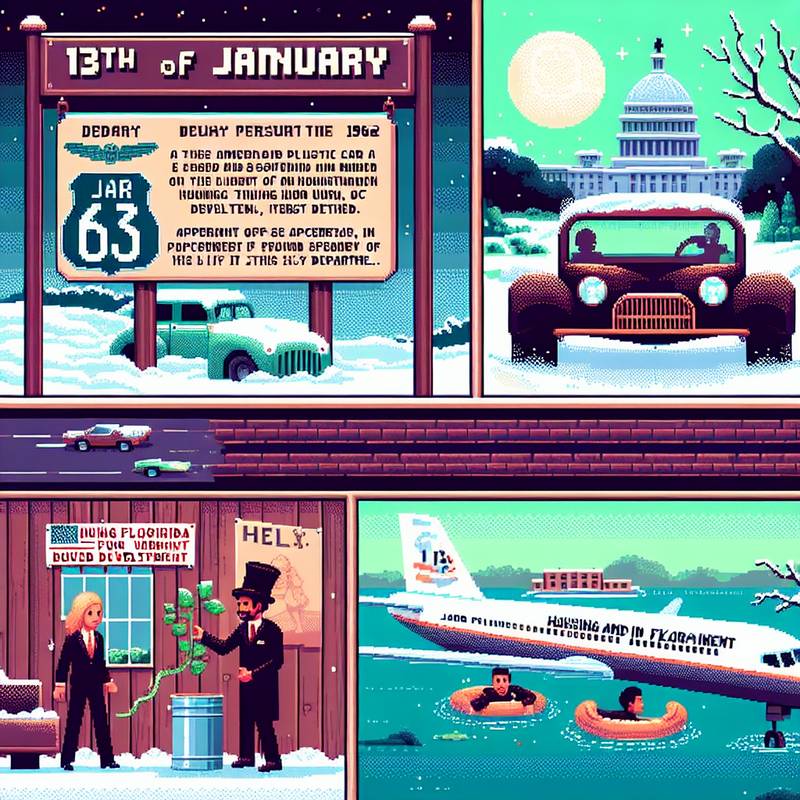 On this day (13 January), peculiarities have pirouetted through American history like a flamingo in a fez. In 1942, Henry Ford patented the plastic car – a bouncy motor made with soybeans. Imagine! Cruising down Route 66 in a pudding-proof vehicle grown in a field. You could drive it, crash it and then eat it. Deliciously avant-garde.
On this day (13 January), peculiarities have pirouetted through American history like a flamingo in a fez. In 1942, Henry Ford patented the plastic car – a bouncy motor made with soybeans. Imagine! Cruising down Route 66 in a pudding-proof vehicle grown in a field. You could drive it, crash it and then eat it. Deliciously avant-garde.Then in 1966, Robert C. Weaver was appointed as the first Secretary of Housing and Urban Development. A man with a proper name like someone who repairs time-travelling top hats. Mind you, he probably didn’t.
And in the realm of the outlandish, back in 1982, an Air Florida plane attempted an ice ballet in Washington, D.C., but alas, nature had other ideas. The crash on the Potomac was tragic, but amid the chaos rose a heroic spectacle—a man named Arland D. Williams Jr., who passed lifelines to others until he could not anymore. A proper, silent, valiant sort. No cape, no fanfare. Just bravery stiff as a board.
The 13th of January—equal parts whizzbang, sorrow, and soy.
Loading...
New Orleans and Portland: A Tale of Two Moods
 The air in New Orleans does not simply fill your lungs—it charms them, seduces them with a perfume of magnolia, fried dough, and distant jazz. Sidewalks crack under the weight of history, and locals speak not just in words, but in rhythms that echo the syncopation of brass bands drifting from a Sunday parade. It is a city that remembers, and remembers lavishly.
The air in New Orleans does not simply fill your lungs—it charms them, seduces them with a perfume of magnolia, fried dough, and distant jazz. Sidewalks crack under the weight of history, and locals speak not just in words, but in rhythms that echo the syncopation of brass bands drifting from a Sunday parade. It is a city that remembers, and remembers lavishly. Contrast this with the cool restraint of Portland, Oregon—misty mornings and cafes lined with felt hats and novels, where conversation is filtered through irony and the trees lean in to listen. Here, heritage is something quietly repotted, like houseplants moved to better light. The past, while acknowledged, has been composted into something new, something green and local.
They are both richly human, these cities—one holds your face between its hands and kisses you on both cheeks; the other nods from across the street, inviting you to walk a while, slowly, thoughtfully, under trees that know your name.
Loading...
Savannah’s Humming Secret
 The people of Savannah, Georgia aren’t just effortlessly charming because they live among moss-draped oaks and cobblestones that whisper gossip from 1846. They’re charming because they know something you don’t: Wright Square has a ghost that no trolley tour ever gets quite right.
The people of Savannah, Georgia aren’t just effortlessly charming because they live among moss-draped oaks and cobblestones that whisper gossip from 1846. They’re charming because they know something you don’t: Wright Square has a ghost that no trolley tour ever gets quite right.The shiny plaques and guidebooks will tell you it's haunted by Alice Riley, the first woman hanged in Georgia. But locals—the ones who’ll sip sweet tea with you long enough to decide you’re worth the secret—know that’s just the surface story. What they’ll tell you, quietly, is that the square hums. Not a metaphorical hum, a literal one. Around dusk, if you’re still and quiet (harder than it sounds), you’ll catch a low, vibrating note in your chest—not your ears. Old-timers chalk it up to something buried deeper than bones or guilt. Something alive. Maybe it’s the weight of history. Maybe it’s Alice. Either way, if the square ever stops humming, locals know to leave.
Savannah never pretends—it just keeps its strangest truths to itself.
Loading...
If You Only Know One Thing About New Orleans
 If you only know one thing about New Orleans, know this: the city is less an assemblage of streets and more a fevered improvisation upon the theme of existence itself. Built on sinking ground and stubborn grace, it dances perpetually on the border between decay and divinity. This is a place where funerals swing rather than sob, where time forgets to be linear, and where even the ghosts wear perfume.
If you only know one thing about New Orleans, know this: the city is less an assemblage of streets and more a fevered improvisation upon the theme of existence itself. Built on sinking ground and stubborn grace, it dances perpetually on the border between decay and divinity. This is a place where funerals swing rather than sob, where time forgets to be linear, and where even the ghosts wear perfume.New Orleans did not so much survive disaster as seduce it—transforming tragedy into myth and myth into music. The city’s heartbeat is syncopated like jazz, that most American of art forms, not born but conjured here, like a storm that learned to smile.
To understand the United States, one might read its laws; to feel it—to taste its soul—one must stroll through the humidity of Frenchmen Street at midnight, where the air is thick with trumpet and truth. New Orleans is not simply a place—it is an argument for beauty in the face of impermanence.
Loading...
Balloons, Moon Landings and a Phone That Ate the World
 On this day (January 9), Americans woke up to the usual existential dread and cereal, but history had other plans.
On this day (January 9), Americans woke up to the usual existential dread and cereal, but history had other plans.In 1793, Jean Pierre Blanchard floated above Philadelphia in the first balloon flight in the U.S., presumably trying to escape early American dentistry. Imagine the sheer madness of it—no seat belt, just hope and a large silk bag full of explosive gas. That’s not transport, that’s a polite death wish.
Then in 2007, Apple unveiled the iPhone. People lost their minds over a phone that did everything: call, text, destroy attention spans, slowly rewire human interaction until even your grandmother now speaks in emojis and passive-aggressive 'Seen' receipts. It’s not just a device; it’s a pocket shrine to distraction.
Meanwhile, in 1968, the Surveyor 7 landed on the moon. That’s right—people fired a robot at the moon before they could reliably get a television to stop flickering during a storm. Priorities.
There’s something poetic about it—swinging between sky-bound balloons and moon machines, while desperately trying to talk to a fridge via Bluetooth.
Loading...
The 8th is Never Boring
 On this day (January 8), America has served up a buffet of fascinating moments—some genius, some straight-up bizarre.
On this day (January 8), America has served up a buffet of fascinating moments—some genius, some straight-up bizarre. In 1790, George Washington delivered the first State of the Union address. Picture the ultimate group project presentation, but with powdered wigs and no PowerPoint. Washington shows up like, “So... how’s America doing?” and everyone’s just nodding nervously like, “Yeah, great, George. Totally fine. No pressure.”
Then in 1935, the King of Rock ‘n’ Roll, Elvis Presley, was born. Think about that—no Elvis, no hip thrusts, no suspicious minds. Music probably stays buttoned-up and polite forever. The man changed what swagger looked like. He made sideburns cool. That’s a cultural earthquake right there.
And in 2002, Michael Jackson let fans into Neverland Ranch for free. You know, just casually opening up his literal fantasyland. People walked into a private amusement park like it was Disneyland with more glitter and fewer rules.
January 8 isn’t just a day on the calendar. It’s a mixtape of American ambition, music, and myth—because sometimes, this country writes its own plot twists.
Loading...
From Glamour to Greyhound Vibes
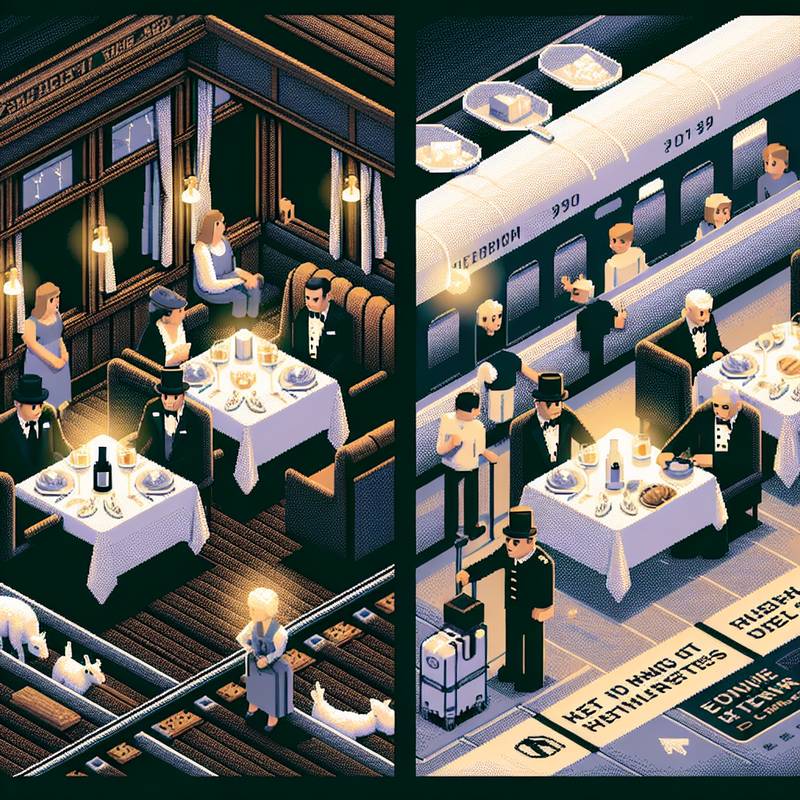 Back in the day, people used to take trains across the country like they were on a glamorous cross-country adventure. There were dining cars with white tablecloths, people dressed like they were attending the Oscars just to ride from St. Louis to Denver. And now? Trains are where you go to experience every stage of regret in one enclosed space. You're sitting under a flickering light with some guy named Carl talking about his “healing crystals,” and the train is four hours late because a cow looked at the tracks.
Back in the day, people used to take trains across the country like they were on a glamorous cross-country adventure. There were dining cars with white tablecloths, people dressed like they were attending the Oscars just to ride from St. Louis to Denver. And now? Trains are where you go to experience every stage of regret in one enclosed space. You're sitting under a flickering light with some guy named Carl talking about his “healing crystals,” and the train is four hours late because a cow looked at the tracks.Airports are no better. In the 1960s, air travel was so luxurious that even smoking was elegant. Now, they make you take off your shoes, your belt, your dignity, and then charge you $9 for a bottle of water that tastes like despair. The only difference between a modern airport and a hostage situation is that in a hostage situation you’re more likely to get peanuts.
We've turned luxury travel into a group project called 'collective patience testing. And guess what? We're all failing it.
Loading...
Historic Surprises and Bruised Knees
On this day (6 January), Americans have proven that the post-holiday slump can breed some rather inventive moments. In 1912, New Mexico decided it would stop loitering around the US border and officially became the 47th state. Took long enough, really. The rest of the country had been playing the national game without it for over a century.Fast forward to 1941—just when you thought speeches couldn't rival a weather forecast in excitement—President Roosevelt delivered his 'Four Freedoms' address. Basically said people should be free to speak, worship, not get shot at, and not starve. Revolutionary stuff, apparently.
Then in 1994, figure skater Nancy Kerrigan was famously whacked in the knee with a baton. Everyone was shocked that anything interesting could happen in the world of ice skating that didn't involve sequins or falling on your backside. At least it gave evening news something more thrilling than record-low lettuce prices.
So yes, 6 January. Always full of promise, confusion, and the occasional rogue knee assault.
Loading...
The Cult of Small Talk
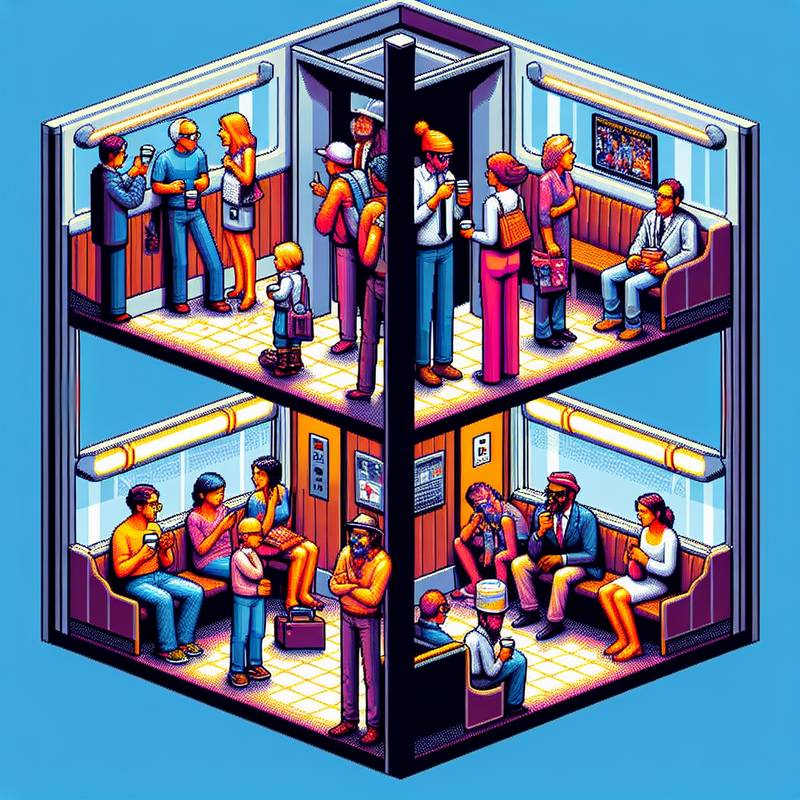 Americans love their “small talk.” This isn’t communication, it’s verbal bubble wrap. We fill the air with fragments of speech like “Hot enough for ya?” or “Crazy weather we’re having,” as if the planet’s climate is a new concept. What we’re really saying is, “Don’t worry, I’m harmless. I’m not here to mate, murder, or borrow money.”
Americans love their “small talk.” This isn’t communication, it’s verbal bubble wrap. We fill the air with fragments of speech like “Hot enough for ya?” or “Crazy weather we’re having,” as if the planet’s climate is a new concept. What we’re really saying is, “Don’t worry, I’m harmless. I’m not here to mate, murder, or borrow money.”It’s a ritual. In elevators, at bus stops, waiting for coffee—it’s like a secret handshake for people who’d rather not actually shake hands. And Americans expect it. Try skipping small talk and going straight to something meaningful. Say, “I often ponder the futility of existence,” and watch the smiles die faster than a goldfish in Gatorade.
We spend years teaching our kids, “Stranger danger!” Then we toss them into a world where every stranger’s expected to ask how your day’s going—while not really caring about the answer. Small talk isn’t about connection. It’s about managing silence, that terrifying void where real thoughts might live. You can say a lot by saying nothing, but we’d rather say nothing by saying a lot.
Loading...
Ghost City on the Prairie
 Blink and you'll miss it—literally, because there’s no massive sign, no themed gift shop, and certainly no bloke in period costume shouting 'Hark!' Welcome to the Cahokia Mounds in Illinois: an ancient city built by Native Americans while medieval Europeans were still figuring out how to make a decent door hinge. Stretching over 2,000 acres, this pre-Columbian metropolis once housed tens of thousands—America’s original skyscrapers were earthen, and one of them, Monk’s Mound, still looms with a brooding, grassy majesty.
Blink and you'll miss it—literally, because there’s no massive sign, no themed gift shop, and certainly no bloke in period costume shouting 'Hark!' Welcome to the Cahokia Mounds in Illinois: an ancient city built by Native Americans while medieval Europeans were still figuring out how to make a decent door hinge. Stretching over 2,000 acres, this pre-Columbian metropolis once housed tens of thousands—America’s original skyscrapers were earthen, and one of them, Monk’s Mound, still looms with a brooding, grassy majesty.It’s the kind of place that forces you to recalibrate your idea of what “American history” means. There’s no fast food nearby blaring banjos; just a haunting silence, broken only by the wind whooshing over what used to be the beating heart of a civilization far older than your local strip mall. It’s like stumbling upon the ruins of Atlantis, except it’s real, landlocked, and doesn’t require James Cameron to over-explain it.
Go now, before someone tries to turn it into an escape room.
Loading...
Oddities of 3 January: From Straws to Stars
 On this day (3 January), Americans were busy proving that history, like your nan's sewing kit, is full of strange little surprises.
On this day (3 January), Americans were busy proving that history, like your nan's sewing kit, is full of strange little surprises.In 1888, Marvin C. Stone patented the drinking straw. Before that, people just looked at liquids and hoped for the best. Imagine the first person to use it — “I’m not kissing that glass again, it smells like pickled regret.” He made it from paper, which, oddly, is now considered modern.
Then in 1959, Alaska was officially admitted as the 49th state. A place so big, people forget it's not Russia. Imagine being the person who had to sew another star on the flag — “Oh brilliant, now I’ve got to explain geometry to the kids.”
And in 2004, NASA’s Mars rover Spirit landed on the Red Planet. A robot that travels millions of miles just to take blurry photos of rocks. Which, let’s face it, is the cosmic equivalent of your uncle going on holiday and sending back a postcard of a car park.
These aren’t just events. They’re humanity’s odd little attempts to make sense of the chaos.
Loading...
The Peculiar Pace of January 2
 On this day (January 2), memory behaves like vapor—formless, fleeting, just enough to catch a glimpse of something peculiar before it's gone. In 1974, President Nixon signed the national speed limit into law, a gesture both pragmatic and desperate, as if decelerating cars could somehow slow the unraveling of everything else. Somewhere that same day, in a hotel room in New York, Tex Ritter—a cowboy troubadour of mythic America—collapsed and died, his heart giving out just as jukeboxes across the country played his voice without knowing.
On this day (January 2), memory behaves like vapor—formless, fleeting, just enough to catch a glimpse of something peculiar before it's gone. In 1974, President Nixon signed the national speed limit into law, a gesture both pragmatic and desperate, as if decelerating cars could somehow slow the unraveling of everything else. Somewhere that same day, in a hotel room in New York, Tex Ritter—a cowboy troubadour of mythic America—collapsed and died, his heart giving out just as jukeboxes across the country played his voice without knowing.And in Pasadena, roses marched. The Rose Bowl Parade, unrelenting in its polished pageantry, rolled on as it always does, undisturbed by wars or weather, as though a floral procession could outpace entropy. Elsewhere, George Foreman was training to demolish something, someone—history maybe. These fragments—speed, death, bloom, brute force—they don't explain America, but they do stitch its odd rhythm. On January 2, clarity doesn't arrive. It dissolves in the particulars.
Loading...
An Anthropologist at the Bumper
 Try explaining “tailgating” to a Martian. “Yes, it’s a communal ritual where people gather in a car park—yes, where you usually put the vehicles—and grill meat from something often called a ‘pigskin’ game, which is not about pigs, but about very large humans moving a ball in a game with less foot and more armour than you’d expect.”
Try explaining “tailgating” to a Martian. “Yes, it’s a communal ritual where people gather in a car park—yes, where you usually put the vehicles—and grill meat from something often called a ‘pigskin’ game, which is not about pigs, but about very large humans moving a ball in a game with less foot and more armour than you’d expect.” It’s a peculiar form of celebratory liminality: neither at the match nor wholly removed from it. A pre-celebration celebration. Grills pop up like mushrooms after rainstorms, coolers overflow with beer brands that sound like midwestern rivers, and debates rage over the exact moment ketchup becomes culinary heresy.
Tailgating is less about the event that follows and more about the montage before it—choreographed chaos with folding chairs and team flags, where strangers become comrades for a few boozy, burger-scented hours. It’s America in microcosm: competitive, generous, proudly informal, and oddly vehicular.
And it absolutely must take place beside the vehicle, otherwise it’s just… lunch.
Loading...
The Sacred Art of Parking Lot Picnics
 “Tailgating.” They call it tailgating. It’s not road rage. It’s sandwiches in a car park. A kind of pre-match picnic, if you like, but with more Bud Light and folding furniture. Americans drive (important: they always drive), then halt near a stadium and proceed to eat near the boot of their vehicle. Gasoline still warm, cheeseburgers already sweating. There’s bunting. There’s cornhole. There’s a man called Chad prodding ribs on a travel-sized grill he once described as “his baby.”
“Tailgating.” They call it tailgating. It’s not road rage. It’s sandwiches in a car park. A kind of pre-match picnic, if you like, but with more Bud Light and folding furniture. Americans drive (important: they always drive), then halt near a stadium and proceed to eat near the boot of their vehicle. Gasoline still warm, cheeseburgers already sweating. There’s bunting. There’s cornhole. There’s a man called Chad prodding ribs on a travel-sized grill he once described as “his baby.”It ostensibly precedes sport, but the allegiance is often murky. Teams are mentioned. Teams are occasionally chanted. But mostly it’s about the ritual: the laying out of condiments, that bit where someone produces a Bluetooth speaker and insists on ‘classic rock’, and a cooler – always a cooler – filled with drinks that must be grasped with a patented American enthusiasm.
What we’re really seeing is communion, camaraderie, grilled meat, and a stubborn refusal to picnic anywhere that isn’t tarmac-adjacent.
Cultural curiosity? Absolutely. But also a holy rite, wrapped in bacon, clutched in a paper towel.
Loading...
December 30: A Pre-New Year Plot Twist
 On this day (December 30), America was out here doing weird flexes before the New Year even started. Like in 1924, when Idaho’s legislature decided: “You know what Christmas needs? Less chill.” So they introduced a bill to outlaw Christmas gift-giving. Yup—apparently, Santa was doing too much. Meanwhile, the rest of the country was like, “Bro, we just figured out how to make paper snowflakes.”
On this day (December 30), America was out here doing weird flexes before the New Year even started. Like in 1924, when Idaho’s legislature decided: “You know what Christmas needs? Less chill.” So they introduced a bill to outlaw Christmas gift-giving. Yup—apparently, Santa was doing too much. Meanwhile, the rest of the country was like, “Bro, we just figured out how to make paper snowflakes.”Fast forward to 1927, the first subway line under the Hudson River opened. New Yorkers got a taste of public transit that actually crossed state lines without requiring spiritual surrender. It was like the prequel to every MTA delay you’ve ever suffered—but with optimism.
And on a lighter note, 1980 gave us the patent for the magical device we now call the “camcorder.” Basically, the beginning of every wedding video, every dad going “Say something!” on Christmas morning, and... the start of surveillance footage being everyone’s business.
America, even on the verge of a calendar reset, finds new ways to be extra.
Loading...
uslistings.org (c)2009 - 2026